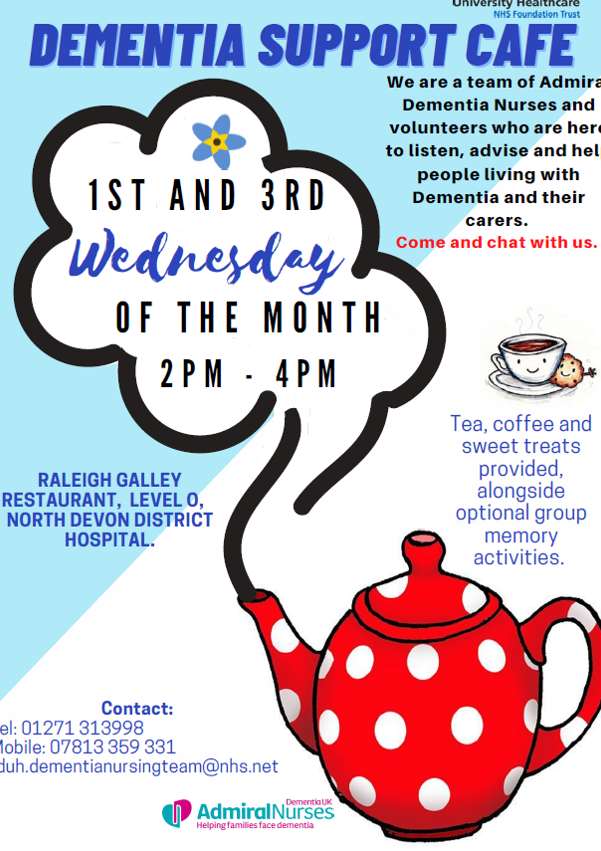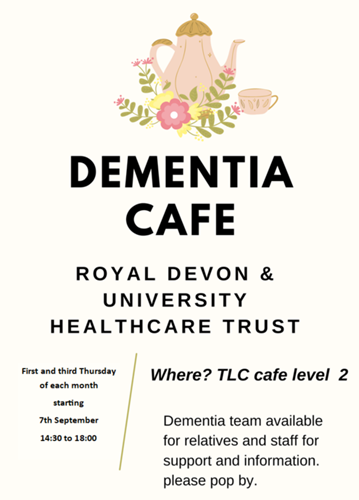Dementia
Dementia is an umbrella term for a progressive condition of the brain. Dementia describes a set of symptoms that may include memory loss and difficulties with thinking, problem-solving or language. The most common types are Alzheimer's, Vascular, Lewy body, frontotemporal and mixed.
The brain is made up of nerve cells (neurones) that communicate with each other by sending messages. Dementia damages the nerve cells in the brain so messages can’t be sent from and to the brain effectively, which prevents the body from functioning normally. The specific symptoms that someone with dementia experiences will vary depending on the parts of the brain that are damaged and the disease that is causing dementia.
We are committed to providing the very best care possible for our patients with dementia and delirium at the Royal Devon. Our staff are trained to understand and support people with these conditions, providing kind, compassionate and considerate care. We participate in numerous schemes, local and national, to promote and advance the wellbeing of people with dementia in our care. See below for more information.
Contact us
Northern services
Angela Walter - Admiral Nurse — Dementia Clinical Nurse Specialist
Email: angela.walter1@nhs.net
Tel: 01271 313998
Bleep: 599
Address: Trinity Suite, Level 5
Northern Devon District Hospital
Raleigh Park,
Barnstaple,
Devon EX31 4JB
Eastern services
Royal Devon and Exeter Hospital (Wonford)
Main switchboard on 01392 411611
Healthcare for Older People Wards
Ashburn Ward (Level 2, Area E) 01392 404530
Bolham Ward (Level 1, Area A) 01392 402777
Bovey Ward (Level 2, Area R) 01392 402560
Kenn Ward (Level 2, Area R) 01392 402553
Torridge Ward (Level 1, Area B) 01392 402760
Acute Care of Elderly/Frailty Unit - Wynard Ward (Centre for Women’s Health, Level 1) 01392 403317
Types of dementia and treatment
There are three main types of illness which lead to dementia:
Alzheimer’s Disease
This is the commonest form of dementia. There is gradual and progressive decrease in cognitive function usually starting off with the loss of short term memory. A person can then develop problems with skilled motor tasks, speech and language, visual processing, and problems organising complex tasks such as paying bills.
Alzheimer’s is characterised by microscopic changes within the brain cells consisting of tangles and plaques and cerebral atrophy (shrinkage of the brain).
Treatment for Alzheimer’s Disease: Medication such as acetylcholinesterase inhibitors are available for patients with Alzheimer’s disease and can sometimes help with memory as well as mood and behavioural symptoms.
Vascular/Multi-infarct Dementia
Gradual deterioration of small areas of the brain tissue caused by a lack of blood supply eg a clot (like multiple mini-strokes )which affect the person’s memory and abilities to carry out day-to-day functioning. The
deterioration may be in steps.
Treatment for vascular dementia: is addressing all cardiovascular risk factors such as controlling blood pressure, high cholesterol, high glucose suggesting diabetes, stopping smoking and having regular exercise as well as a healthy diet. Anti platelet therapy (eg aspirin) is also indicated in some patients.
Dementia with Lewy Bodies
People with dementia with Lewy Bodies will typically have some symptoms of Alzheimer’s and Parkinson’s disease. They often experience memory loss, spacial disorientation, communication difficulties, and symptoms of Parkinson’s disease such as slowness, muscle stiffness, trembling of the limbs and a tendency to shuffle when walking, loss of facial expression and changes in the strength and tone of the voice.
Their abilities tend to fluctuate daily even hourly and they often have falls or funny turns. They also experience visual hallucinations often of people or animals.
Treatment for dementia with Lewy Bodies: Some acetylcholinesterase inhibitors have been shown to improve symptoms.
Admiral nurse service
Dementia UK provides specialist dementia support for families through the Admiral Nurse Service, these nurses are hosted by the Trust to provide the specialist dementia support families need.
When things get challenging or difficult for people with dementia and their families, Admiral Nurses work alongside them, giving the one-to-one support, expert guidance and practical solutions people need. The unique dementia expertise and experience an Admiral Nurse brings is a lifeline–it helps everyone in the family to live more positively with dementia in the present, and to face the challenges of tomorrow with more confidence and less fear.
There are currently Admiral Nurses in the following areas; Barnstaple, Topsham, Woodbury, Exmouth and Budleigh, Honiton and Sidmouth.
How we care for our patients with Dementia
John’s Campaign
People with dementia are often more confused and frightened when in hospital which can be relieved when their carer stays with them. We support John's Campaign at both of our acute hospitals. This means we give open access visiting to carers of people with dementia and they have the right to stay all day and all night if they wish.
Small reminders of home
If you are unable to visit, it would be appreciated if some small reminders of home could be sent in that may help people feel more comfortable. Photographs that can be laminated- especially if the names of people/pets can be added to allow staff to talk about the pictures, favourite books or magazines could all help to make a person feel more at ease.
We encourage and support the use of ‘This is Me’ created by the Alzheimer’s Society and if you have one of these we would find it really useful if it could come into hospital, or be available to teams who may visit you at home.
Dementia-friendly garden - East
We are lucky to have access to a lovely dementia-friendly garden space at the Royal Devon and Exeter Hospital (Wonford) which provides a tranquil setting for people to be able to sit or walk safely around paths. The garden has benches to sit on and sensory areas to enjoy. Please ask staff on the ward about how you can access this.
Dementia-friendly approach
We have dedicated wards/areas that are designed to be dementia-friendly and our staff have regular training to ensure we are able to provide the highest quality care to patients with dementia and delirium.
Dementia and Delirium Champions
We have a network of Dementia and Delirium Champions across the Trust who work together to deliver projects that are designed to improve the experience of patients and their families/carers.
'This is me'
‘This is me’
“If today you can tell me everything about yourself but tomorrow you can’t, what would you want me to know?”
We use a document called ’This is me’ which can be downloaded from the Alzheimer's Society website. We want all people living with dementia who come into our care to have their own ’This is me’ document. This helps us personalise care to each individual and lets us know your likes and dislikes, life so far and how you take your cup of tea.
Supporting you
We encourage you and your family or carers to raise any concerns or queries with the nurse in charge on the ward at the time.
Care Direct provides information and help for older people, vulnerable adults and their carers. Call 0845 1551 007. Alzheimer’s Society website: www.alzheimers.org.uk
South West Dementia Partnership website: www.southwestdementiapartnership.org.uk
Northern services
Dementia Support cafe
See below
Eastern services
Dementia steering group
The Royal Devon and Exeter Hospital has a ‘Dementia Steering Group’ that provides guidance and monitors hospital care standards for those with dementia and their carers.
Honiton Memory Cafe
Honiton Memory Café is a volunteer-led friendly meeting place for people who have a new diagnosis of dementia or who are experiencing difficulties with their memory.
Any enquiries can be made by phone to our Memory Café Coordinator on 07789 104 601 or by email to info@dementiahoniton.org.uk.
Dementia support cafe - North Devon District Hospital
Dementia support cafe at North Devon District Hospital runs on the 1st and 3rd Wednesday of each month from 2-4pm.
Anyone is welcome to come along and join us, to have a cup of tea/coffee, our favourite biscuit and cakes as well as meet and speak with the Admiral Nursing Team.
Contact
Tel: 01271 313998 Ext 4218
Mobile: 07813 359 331
Email: rduh.dementianursingteam@nhs.net

Dementia cafe - Royal Devon and Exeter Hospital (Wonford)
Hayley Bastick
Dementia and Delirium Specialist nurse
Email: Hayley.bastick@nhs.net
Phone: 07824 834330
Mandy Cheyne
Admiral Nurse
Email Amanda.cheyne@nhs.net
Contact 07435602925

Patient information leaflets
We produce a wide range of leaflets which provide information about our services and about the treatment you might receive in our clinics or during your stay in hospital.
We also produce these in different formats including large print, please contact the department you are visiting for more information.
Information for healthcare professionals
Please visit the North Devon Formulary and Referral website
